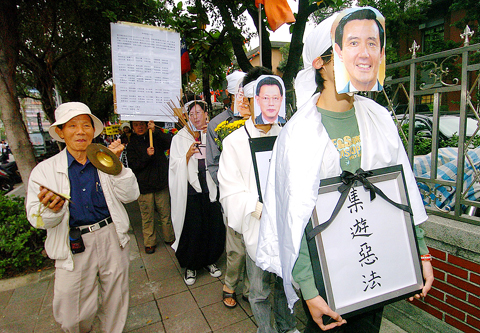Chinese Nationalist Party (KMT) and Democratic Progressive Party (DPP) lawmakers waged a war of words yesterday as they accused each other of slowing down or blocking the Assembly and Parade Law (集會遊行法) revision process.
The legislature’s Internal Administration Committee had been scheduled to review draft amendments submitted by both parties yesterday.
However, DPP caucus whip William Lai (賴清德) protested when KMT Legislator Wu Yu-sheng (吳育昇), the committee’s convener, said the legislature should wait for the Cabinet to propose its own draft amendment and hold a public hearing next Thursday.

PHOTO: CHIEN JUNG-FONG, TAIPEI TIMES
“You’re trying to delay the [law revision] process by holding yet another public hearing next week,” Lai said.
“We should start an article-by-article review after a general discussion today,” he said.
Wu disagreed, saying that the goal of a public hearing was “to hear opinions from different people, including the Wild Strawberries,” in a bid to improve the quality of the amendment.
The “Wild Strawberry Movement” refers to a group of college students staging a silent sit-in protest at Liberty Square in Taipei since Nov. 6. Their demands include revision of the law.
“If the DPP is opposed to a public hearing, then you should go out and tell the Wild Strawberries,” Wu said.
The dispute intensified when DPP lawmakers accused the KMT of having a long history of blocking revisions to the law.
“During a meeting in 2006 over which you, Wu Yu-sheng, presided, you tried to block the Assembly and Parade Law amendment process,” Lai said.
“I’ve always respected you, Legislator Lai, but as a politician, you should not lie,” Wu shouted back.
“Yes, there was a public hearing in 2006, and yes, I presided over the meeting — but it was the DPP that opposed an article-by-article review [of the Assembly and Parade Law] afterwards,” Wu said.
Several DPP and KMT lawmakers joined their colleagues in the debate, but the two sides failed to reach a consensus, leaving the Assembly and Parade Law amendment process stalled.
Later, a few KMT legislators including Wang Jin-shih (王進士) expressed concern that revising the Assembly and Parade Law might result in too many protests.
If the requirement for event organizers to seek approval from law enforcement authorities before holding a rally is rescinded, “then there may be demonstrations every day, which could lead to social unrest,” Wang said.
“As long as people don’t open their minds, and bear hatred in their minds, they will take it to the street every day,” Wang added.

The manufacture of the remaining 28 M1A2T Abrams tanks Taiwan purchased from the US has recently been completed, and they are expected to be delivered within the next one to two months, a source said yesterday. The Ministry of National Defense is arranging cargo ships to transport the tanks to Taiwan as soon as possible, said the source, who is familiar with the matter. The estimated arrival time ranges from late this month to early next month, the source said. The 28 Abrams tanks make up the third and final batch of a total of 108 tanks, valued at about NT$40.5 billion

Travel agencies in Taiwan are working to secure alternative flights for travelers bound for New Zealand for the Lunar New Year holiday, as Air New Zealand workers are set to strike next week. The airline said that it has confirmed that the planned industrial action by its international wide-body cabin crew would go ahead on Thursday and Friday next week. While the Auckland-based carrier pledged to take reasonable measures to mitigate the impact of the workers’ strike, an Air New Zealand flight arriving at Taipei from Auckland on Thursday and another flight departing from Taipei for Auckland on Saturday would have to

A group from the Taiwanese Designers in Australia association yesterday represented Taiwan at the Midsumma Pride March in Melbourne. The march, held in the St. Kilda suburb, is the city’s largest LGBTQIA+ parade and the flagship event of the annual Midsumma Festival. It attracted more than 45,000 spectators who supported the 400 groups and 10,000 marchers that participated this year, the association said. Taiwanese Designers said they organized a team to march for Taiwan this year, joining politicians, government agencies, professionals and community organizations in showing support for LGBTQIA+ people and diverse communities. As the first country in Asia to legalize same-sex

MOTIVES QUESTIONED The PLA considers Xi’s policies toward Taiwan to be driven by personal considerations rather than military assessment, the Epoch Times reports Chinese President Xi Jinping’s (習近平) latest purge of the Chinese People’s Liberation Army (PLA) leadership might have been prompted by the military’s opposition to plans of invading Taiwan, the Epoch Times said. The Chinese military opposes waging war against Taiwan by a large consensus, putting it at odds with Xi’s vision, the Falun Gong-affiliated daily said in a report on Thursday, citing anonymous sources with insight into the PLA’s inner workings. The opposition is not the opinion of a few generals, but a widely shared view among the PLA cadre, the Epoch Times cited them as saying. “Chinese forces know full well that